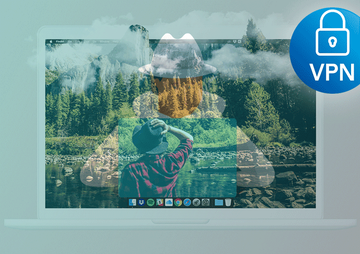VPN (Virtual Private Network) is a service designed to ensure the anonymity of communication between computers and to prevent the interception and reading of transmitted data.
To safeguard the data sent and received, two things are needed - a special VPN for Mac installed on your computer that will encrypt and decrypt data, and an application on the server of the company providing the VPN service.
In practice, when you visit a website with the help of a browser or request a file download, the VPN application installed on your Mac computer encrypts the data required for connection, and only then sends it through the Internet.
The VPN server then sends a request to the destination server, and in response, the necessary data is transmitted to the VPN server. Then it goes to the ISP and finally to your Mac computer, where it is decrypted by the installed VPN application and transmitted to the web browser or saved on disk.
The Internet Service Provider can only register your connections to the VPN server, but cannot see what exactly it is as the content is encrypted. In turn, the target servers register that the VPN server is connected to them (not your Mac computer). In other words, the visited site "sees" the IP address of the VPN server and not your real IP.
VPN service - anonymity on any network
In some countries, Internet Service Providers are required to collect and store data relating to their customers’ connections. In addition, rules require them to store information about who the IP address belongs to, and provide this information at the request of the authorities, such as the police. Even if some countries do not require such information, you cannot be sure that ISPs do not collect information about the content of your Internet connections.
VPN service companies strive to provide anonymity to their clients. Most VPN service providers ensure that client connection logs are not recorded or stored, so even if the authority or other institution requests data, VPN service will not be able to provide them, since this data simply does not exist.
However, the claims of some VPN service providers may differ from the truth. As shown by the HideMyAss case, which, at the request of the FBI, provided data for one of its clients, although, according to previous claims, it did not store such data.
Please mind that VPN service providers may rent servers from other companies that may use different rules regarding logs and registration of connection activity. Their statements about anonymity must be treated with caution.
What to look for when choosing a VPN
There are a lot of VPN services, and each of them advertises itself as the best, most affordable, and providing anonymity at the highest level.
Before selecting a specific service, pay attention to the following parameters:
- Mind the location of the headquarters of the company providing the service. Some countries may require a VPN to keep logs.
- Mind the number of servers available for anonymous connections.
- Mind the number of countries in which the company has VPN servers. The further the country is, the greater the delay and connection speed.
- Mind the number of simultaneous connections that are allowed. The more connections, the more devices can use a VPN.
- Mind the functionality of the application used to connect to the VPN. It is good if an application shows the current workloads of the available servers and has a kill switch that blocks all connections.
- Mind the actual Internet speed. Here you should rely on the feedback from other users of the selected service or the results obtained during the free trial period.
Mind possible traffic limits. Still, with some services, there are restrictions on the amount of data transferred via VPN.
You should be careful with free VPNs, and not only because, as a rule, they provide a very restricted range of services, but also because they can be dangerous for the user. For example, users of a very popular Hola VPN became part of a Botnet. The computing power of their computers was used by third parties for unknown purposes. It is just an example and not all free VPNs are bad. You just carefully read user reviews and ratings.
